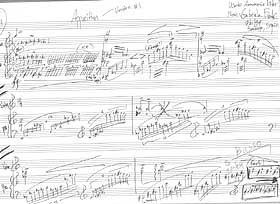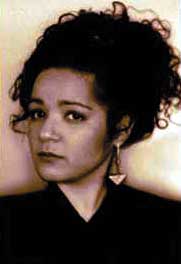|
This is an archived article.
For the latest news, go to the Advance
Homepage
For more archives, go to the Advance Archive/Search Page. |
||||
|
First Winner Of Sackler Composition
Prize Named
By Allison Thompson Composer and pianist Gabriela Lena Frank has been named the recipient of the first Raymond and Beverly Sackler Music Composition Prize. The competition, organized by the School of Fine Arts, supports and promotes composers and the performance of their new musical works. "The prize is part of a broader structure promoting innovation, inventiveness and the creative spirit within the School of Fine Arts," says David G. Woods, dean of the school. "It provides the opportunity for cutting-edge creative exploration and productivity, and will reflect the essence of creativity in the artistic program of the school."
As this year's winner, Frank will receive $20,000, and her piece, "An American in Peru," will have its world premiere in Storrs in the spring. A second performance will take place at the Stamford campus. Frank's composition will tell the story of her Jewish father and his experiences in Peru as a Peace Corps volunteer in the 1960s. The piece, for solo violin and a chamber ensemble of 11 players, will document the blending of Frank's father's Jewish roots with Peruvian influences. Frank's father, reared on a musical diet of wedding tunes from the Klezmer tradition, fell in love with Peru as he traveled through its coastal deserts, Andean mountains, and Amazonian rain forests. Frank's composition will begin from Klezmer roots and spin out over a musical-geographical trail through the many divergent folk styles of Peru in a series of discrete movements, achieving an ever greater fusion of Jewish and Peruvian styles, in much the same way the composer's father increasingly absorbed his new cultural influences. It will culminate with a festive celebration of the union between Frank's father and her Peruvian-Indian mother. Frank's winning proposal was one of 58 entries received for the inaugural Sackler Music Composition Prize. In addition to entries from composers in 20 states, the judges received applications from people in nine other countries. "Words can't adequately express the pleasure and honor I feel at having been selected as the first winner of the Raymond and Beverly Sackler Music Composition Prize," says Frank. "It is not just an opportunity to bring to life a large work using the talents of terrific players, but also a chance to set a high standard of imagination and craft for future recipients of the prize." The prize was established through a gift from Raymond and Beverly Sackler, major philanthropists and frequent donors to the University. The Sacklers fund several important initiatives at the School of Fine Arts, including an artist-in-residence program, the Master Artists and Scholars Institute, and the Art and Archeology Lecture Series. The Sacklers were also instrumental in forging an academic partnership between the Metropolitan Opera and UConn, the first collaboration of its kind between the opera company and an institution of higher learning. In addition to the fine arts programs, the Sacklers fund many other initiatives at UConn. Three nationally known and respected musicians judged this year's competition: John Corigliano, a composer who won the 2001 Pulitzer Prize in Music for his "Symphony No. 2 for String Orchestra"; Raymond Leppard, composer, conductor laureate, and former music director of the Indianapolis Symphony Orchestra; and Joseph Schwantner, who won the 1979 Pulitzer Prize in Music for his work, "Aftertones of Infinity." Frank, who received her bachelor's and master's degrees from Rice University and her doctoral degree from the University of Michigan, has presented concerts as a pianist and as a composer. She has released a number of CDs. The 2003 Raymond and Beverly Sackler Music Composition Prize will be for a 10-15 minute composition for solo trumpet and a chamber ensemble of five to 15 players. Each year, entrants will be asked to compose a piece for a specific area of the musical arts, chosen by the head and other faculty of the music department, such as a jazz ensemble, choir, opera, wind ensemble, children's choir, or solo instrument. |


